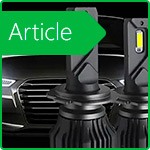Electric cars are becoming increasingly popular among motorists all over the world, Ukraine is no exception. However, to fully enjoy the benefits of this technology, owners need efficient and convenient charging solutions. A wall-mounted charging station provides a convenient and safe way to charge electric vehicles at home or at work, allowing owners to charge their vehicles at their convenience, without having to visit public charging stations.
Why it's beneficial to install a wall-mounted charging station
We recommend buying a personal electric vehicle charger, as it has a number of advantages over conventional plug-in charging. Wall-mounted devices make the process more convenient, efficient and safe. They have built-in protection mechanisms against overheating, short circuits and other possible malfunctions.
In addition, wall-mounted charging stations offer faster charging speeds compared to a conventional outlet. Thanks to their higher power and optimized charging processes, they allow electric vehicles to be charged several times faster, saving time and simplifying owners' daily tasks.
Wall charging stations are thus becoming an integral part of the infrastructure for electric vehicle owners. If you already own an electric car, or are just planning to buy one, you should consider buying an electric charging station for it now.
How to choose the optimal power
The power of the charging station depends on the model of the electric car.
- • For hybrid electric cars, a 3.7 kW station is suitable.
- • For most electric cars, 11 kilowatt charging stations are suitable.
- • Electric vehicles with a large battery may require a station with a capacity of up to 22 kW.
Basic operating modes
The international standard IEC 61851-1 provides 4 modes for this type of charger:
- 1. Mode 1 is the simple and most common method of charging an electric vehicle. It involves connecting the vehicle to an ordinary extension cord without built-in control or protection. It is considered the most dangerous because of the lack of control and the possibility of overheating the equipment. Charging is slow, and the cable itself is not protected and requires constant attention from the car owner.
- 2. Mode 2 is an improved version of charging using the same cable as Mode 1, but with the addition of a built-in controller. This controller provides overheat protection and monitors grounding, making charging safer. However, the charging speed is still slow compared to other modes due to limited power.
- 3. Mode 3 - Mode 3 is the most common and versatile charging method. This mode utilizes a special connector cable that is commonly used on charging stations with power ranging from 3.7 kW for home use to 22 kW for industrial use. This method strikes a balance between safety and charging speed, making it the preferred choice for most electric vehicle users.
- 4. Mode 4 - A fast and efficient charging method that involves direct connection to the vehicle battery. This method offers high charging speeds, but it is also the most expensive due to the need for specialized equipment such as inverters. Mode 4 is often used at charging stations along highways and byways to provide fast charging on long trips.
Classification of chargers by connector type
In addition to classification by charging mode, there are different types of plugs used to connect an electric vehicle to a charging station. These standards are defined by international organizations and ensure the compatibility of electric cars with charging stations around the world.
The types distinguished are:
- • Type 1: Characterized by a round body with five contacts, it is used in the United States, Japan and South Korea. A latch on the connector prevents accidental disconnection. Supports up to 80A current and 240V voltage, which allows charging electric vehicles up to 11kW (32A).
- • Type 2: 7-pin plug compatible with Type 1. Common in the European Union and other countries. Can be single-phase and three-phase electric charging station, supports current up to 63A and voltage 400V. Depending on the current, the charging power can be 11kW (16A) or 22kW (32A).
- • GBT: A Chinese standard similar to but incompatible with Type 2. It is mainly used in China. High power, supports up to 63A current and 400V voltage. Charging power can be 7 kW (16A) or 22 kW (32A).
- • Tesla USA: Tesla's patented connector, used on Tesla Supercharger charging stations. Provides fast charging of Tesla electric vehicles from zero to 100% in just 75 minutes. Supports up to 480A current and 400V voltage, which allows charging electric vehicles up to 250kW.
Where is the best place to install a wall-mounted charging station?
Installation involves a variety of placement options, each with its own advantages and peculiarities. Let's consider several successful options where you can install a charger for electric cars:
- • On the wall of a private house - this option is one of the most common solutions. Advantages include convenient location and no need for additional wiring. However, to protect against external influences such as rain and snow, it is necessary to provide protection against moisture (IP65) and overheating. In this case, you should choose stations with the ability to be installed outdoors.
- • In the garage - is also a popular option. Here the charger is protected from external influences and will be close to the place where the car is parked. For most garages, charging outlets are already provided, making installation easy. This option is especially convenient for use at night.
- • In the parking lot - this is where online-controlled charging stations are usually placed, which provide added convenience and security. They allow you to be notified of sudden power outages and control the charging process remotely. Parking charging stations are suitable for charging during the day and ensure that you can comfortably use your electric vehicle at any time.
The choice of installation location depends on your preferences, needs and the availability of a power connection. Regardless of your choice, it is important to contact professionals to install the charging station and ensure all electrical wiring is working properly.
Features of choosing a charging station for an electric car
When choosing a device, it is important to pay attention to several key aspects that determine the safety, convenience and efficiency of its use.
- • Company-manufacturer: first of all, you should pay attention to the manufacturer of the charging station. You should not focus solely on the cheapest options, as this can negatively affect the safety of your electric car. It is important to study the reviews of other owners and avoid dubious brands to be sure of the quality of the selected equipment.
- • Country of manufacture: each country emphasizes a different type of connector and has its own certification standards. The choice of manufacturing country determines the compatibility of the charging station with your car's electrical systems.
- • Availability of certificates: preference should be given to devices with European CE certificates, as this ensures that the equipment meets international safety standards. This will ensure that the components have been tested in laboratories, and their reliability and durability are confirmed by experts.
- • Power: 3.7 or 11 kW is sufficient for fast charging. It doesn't make sense to overpay for 22 kW, as most electric cars don't use that much power.
- • Power module: we recommend considering contactor-based devices, as they are more reliable and have a longer operating life. Contactors have an arc suppression chamber and orders of magnitude larger copper contact area, making them more durable than relays. As a disadvantage, contactor-based devices can be a bit heavier.
- • Warranty: choose an electric charger with a warranty. Avoid devices without service support in your country, as this can create problems in case of malfunction. For example, Chinese devices will likely have to be sent to the manufacturer at your own expense.
- • Protection: make sure that the model you like has a safety disconnect and ground test devices. These mechanisms prevent overvoltages and electric shocks, ensuring safety for both the charging station and the electric vehicle. It is important to buy a safe charging station so that you can be sure that nothing will happen during its use.
- • Cable: Choose a cable that remains flexible at low temperatures. A flexible cable makes the charging station easy to use in all weather conditions and prevents possible problems during winter use.
In the online store 130.com.ua you can buy wall charging stations for electric cars at a favorable price in Kiev with delivery throughout Ukraine.



















